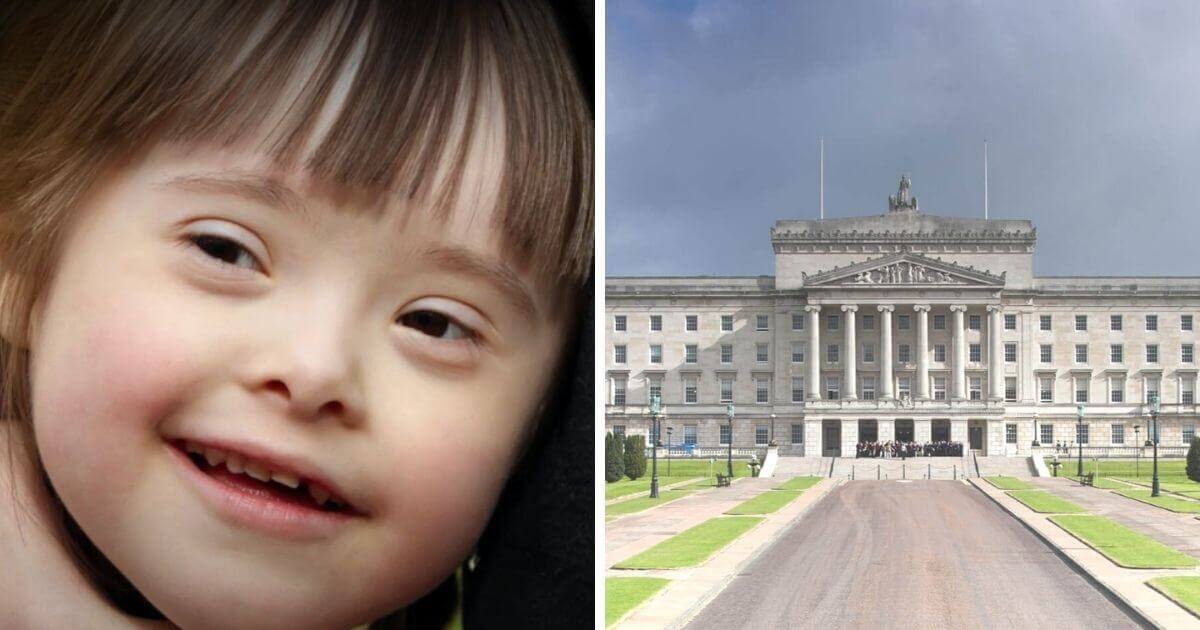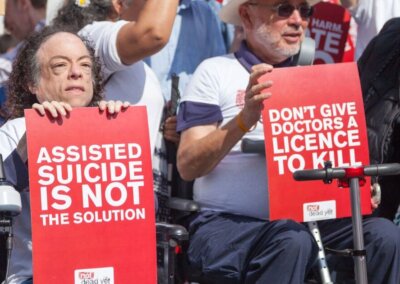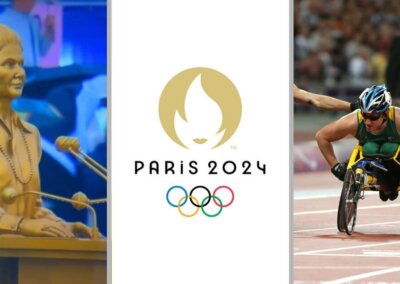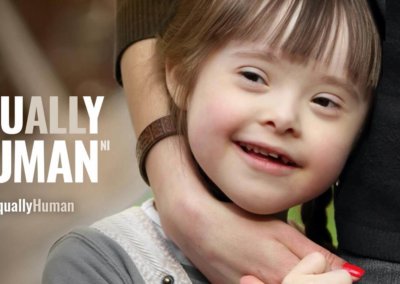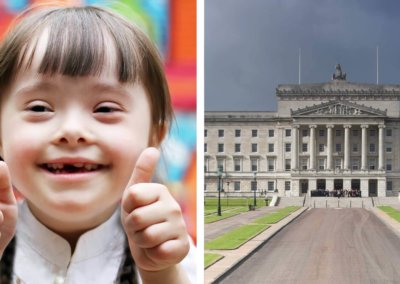This morning a new Bill that intends to prevent unborn babies with a ‘serious fetal impairment’ being aborted up to birth has been introduced to the Northern Ireland Assembly.
Following the imposition of abortion on Northern Ireland by the Government in Westminster, the Abortion (Northern Ireland) (No.2) Regulations 2020 permit abortion up to birth based solely on the diagnosis of disabilities including Down’s syndrome, cleft lip, cleft palate or club foot.
The Severe Fetal Impairment Abortion (Amendment) Bill, which completed a First Stage in the Northern Ireland Assembly this morning, proposes that non-fatal disabilities are not grounds for abortion in Northern Ireland and that the current law discriminates against those with disabilities. The Bill has been produced with the support of the disability campaigning group ‘Don’t Screen Us Out’.
Member of the Legislative Assembly Paul Givan said: “The current law tells those with disabilities that they are worth less than other people, their contribution is less valuable, their lives less important, less full”.
“It invites us to view those with disabilities as less deserving of the protection of the law. The idea that Down’s syndrome is some huge problem that should be addressed by abortion is chilling. You don’t have to look far to see the full lives those with disabilities lead – they enrich our communities and families”.
Disability campaigner Heidi Crowter, who herself has Down’s syndrome and has actively supported this Bill, said: “This bill that allows abortion up to birth in Northern Ireland makes me feel that I am not as valued as anyone else. Maybe people are even told that living with Down’s syndrome is too hard, but research confirms that people with Down’s syndrome and their families are happy with their lives!”
Ahead of the imposition of abortion on Northern Ireland, 2,000 people with Down’s syndrome and their families signed a letter to Boris Johnson asking him to not introduce abortion up to birth for Down’s syndrome to Northern Ireland.
Heidi wrote to the Party Leaders at Stormont, asking them to do everything they could to oppose abortion on the basis of disability up until birth. She said: “Please do not let a law come into practice which will end lives on the basis of disability and stop people like me coming into the world.” Heidi described the extreme legislation as “hurtful and offensive”, and urged Stormont to reject it as “My life has as much value as anyone else’s… please don’t vote for more discrimination against people like me”.
An additional 18,000 people from Northern Ireland urged the Prime Minister and other British MPs to let the people of Northern Ireland decide their own abortions laws.
The Northern Ireland Assembly subsequently passed a motion in opposition to the extreme abortion regulations being imposed on Northern Ireland, which had the support of 75 out of 90 MLAs. The Westminster Government ignored this vote, however, and went ahead with the imposition of the new abortion regime.
Disability abortion in Northern Ireland
Before the new abortion regime was imposed on Northern Ireland, disability-selective abortion for conditions such as Down’s syndrome, cleft lip and club foot was not permitted and there was a culture of welcoming and supporting people with these disabilities rather than eliminating them.
This is reflected directly in the latest figures (2016) from the Department of Health in Northern Ireland, which show that while there were 52 children born with Down’s syndrome in Northern Ireland, in the same year only 1 child from Northern Ireland with Down’s syndrome was aborted in England and Wales.
This contrasts with the situation in the rest of the United Kingdom.
Disability abortion in England and Wales
The latest available figures show that 90% of children diagnosed with Down’s syndrome before birth are aborted in England and Wales.
The BBC’s Victoria Derbyshire Show, recently reported that a mother expecting a child with Down’s syndrome was offered an abortion at 38 weeks’ gestation, and another mother shared her story of being offered an abortion fifteen times after her son was diagnosed with Down’s syndrome.
A recent Freedom of Information request has revealed that at least 710 late-term abortions (between 20 weeks and birth) for Down’s syndrome have taken place in England and Wales over 10 years (2009-2018).
Abortion statistics from England and Wales also reveal that around 75 babies with either cleft lip or cleft palate as their principal condition were aborted between 2011 and 2018.
While the Department of Health and Social Care are reluctant to release data on abortions where a baby has club foot, data reported by Eurocat showed that 205 babies with club foot were aborted in England and Wales between 2006 and 2010.
However, the figures are likely to be much higher – a 2013 review showed that 886 babies with Down’s syndrome were aborted in England and Wales in 2010. Yet only 482 such abortions were reported in Department of Health’s records. Similarly, 157 babies with cleft lip and palate were aborted in England and Wales between 2006 and 2010, whilst the Department of Health and Social Care recorded only 14 such abortions.
Such underreporting was confirmed in a 2014 Department of Health review.
UN Committee condemns disability discrimination before birth
The UN Committee on the Rights of Persons with Disabilities (UNCRPD) has consistently criticised countries that provide abortion in a way which distinguishes between fetuses on the basis of disability, citing Article 5 of the UN Convention on the Rights of Persons with Disabilities (equality and non-discrimination provision).
The UNCRPD has recommended that the UK updates its law on abortion to reflect adherence to the spirit of this convention, specifically suggesting they amend abortion legislation to clarify that abortion should not be legal for disability reasons.
Public called to support new Bill
Pro-life organisation Right To Life UK has called on the public to show their support for the Bill.
They are asking people in Northern Ireland to contact their MLAs asking them to vote for the Bill and, for those outside Northern Ireland, they are asking them to sign a petition to the leaders of the political parties in the Northern Ireland Assembly calling on them to support the Bill.
Right To Life UK spokesperson, Catherine Robinson, said: “The discrimination against people with disabilities in the womb is disgraceful. That this would be written into law is even worse. It is no wonder that the UN Committee on the Rights of Persons with Disabilities have consistently criticised countries which provide abortion in a way that distinguishes between fetuses on the basis of disability, and has specifically suggested they amend abortion legislation to clarify that abortion should not be legal for disability reasons”.
“As sad as it is to admit, Heidi is right: legislation which allows lethal discrimination against people with Down’s syndrome in the womb does send the message that such persons are not as valuable as anyone else. Hopefully this new Bill will help to right past wrongs in regard to the treatment of people with Down’s syndrome who have been subject to this kind of discrimination for decades”.


